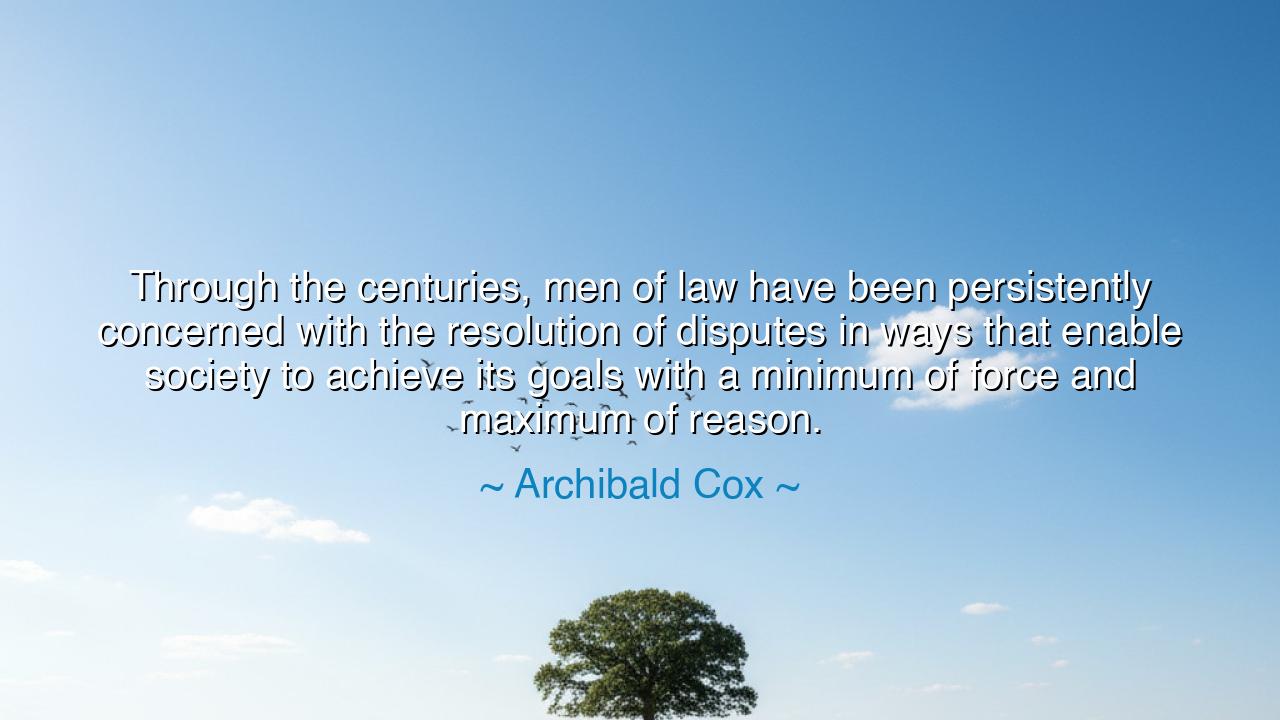
Through the centuries, men of law have been persistently
Through the centuries, men of law have been persistently concerned with the resolution of disputes in ways that enable society to achieve its goals with a minimum of force and maximum of reason.






The words of Archibald Cox, “Through the centuries, men of law have been persistently concerned with the resolution of disputes in ways that enable society to achieve its goals with a minimum of force and maximum of reason,” carry the weight of both history and hope. Here is the voice of a man who lived through moments when the very foundations of American democracy were tested—Cox, who as Watergate Special Prosecutor, stood against corruption in high office. His words are not idle philosophy, but distilled truth: that the purpose of law is not domination, but peace; not vengeance, but reason. The triumph of a society lies in its ability to settle disputes without bloodshed, with reason as its sword and justice as its shield.
The origin of this truth stretches back to the earliest civilizations. In ancient Mesopotamia, Hammurabi carved his code upon stone, seeking to replace vendetta with rule. In Athens, citizens gathered in assembly and courts, preferring debate and persuasion to the endless cycle of violence. In Rome, the great jurists laid the foundations of law that endure even today, striving to build an empire where order was preserved not only by arms, but by principles. Cox, standing in this long lineage, names this eternal pursuit: to reduce the necessity of force and to elevate the dominion of reason.
History teaches us the high cost when societies fail to follow this path. Consider the fate of medieval Europe, where disputes were often settled by sword and fire, where trial by combat and feuds destroyed families and kingdoms alike. Reason was drowned beneath the roar of arms. Only slowly, through the growth of parliaments, courts, and councils, did Europe turn again toward the resolution of disputes through law rather than war. Each step away from force was a step toward civilization, a step toward peace.
Yet there are also glorious examples where the power of reason prevailed. Think of India’s independence movement, where Mahatma Gandhi stood against the might of empire not with armies, but with the unyielding weapon of nonviolence. His cause was not law in the courtroom alone, but law in its higher form—the law of justice written upon the conscience of humankind. With maximum of reason and moral force, he revealed that a nation’s destiny could be won without descending into chaos. Cox’s words find their living example here: that societies achieve their noblest goals when reason triumphs over brute power.
The meaning of this teaching is clear: law is not merely rules; it is the art of building peace. A healthy society must cultivate ways to resolve conflict without tearing itself apart. Every lawsuit, every mediation, every treaty, is a testament to humanity’s yearning to transform conflict into concord, to replace the clenched fist with the open hand. Without this, no society can endure, for perpetual violence is the grave of nations. But with it, a people can flourish, creating not only wealth and order, but dignity and hope.
The lesson for us is timeless. Do not meet conflict first with force, whether in families, in communities, or between nations. Instead, seek reason—listen, deliberate, persuade, and strive for justice. To act with anger may bring victory for a moment, but to act with reason builds harmony for generations. Each of us, though not robed as judges, carries within the power to be men and women of law: to settle disputes with fairness, to lift reason above rage, and to make peace wherever conflict arises.
Practical actions follow this wisdom. In your daily life, resolve quarrels not by harshness but by patience. In your workplace, choose dialogue over domination. In your nation, support leaders and systems that honor the supremacy of law and justice rather than the tyranny of violence. Teach children that to win by reason is greater than to win by force, for reason creates allies while force creates enemies. And when great disputes come, remember that every act of reasoned peace is a shield for the future of your people.
Thus let the words of Archibald Cox endure as both reminder and command: the task of men of law, through the ages, has been to build societies where force is diminished and reason exalted. This is not only the duty of lawyers and judges, but of every citizen who loves freedom. For only when disputes are resolved with justice can a society reach its highest goals. To choose reason over force is to choose civilization over chaos, peace over destruction, and the steady path of progress over the fleeting triumph of violence.






AAdministratorAdministrator
Welcome, honored guests. Please leave a comment, we will respond soon